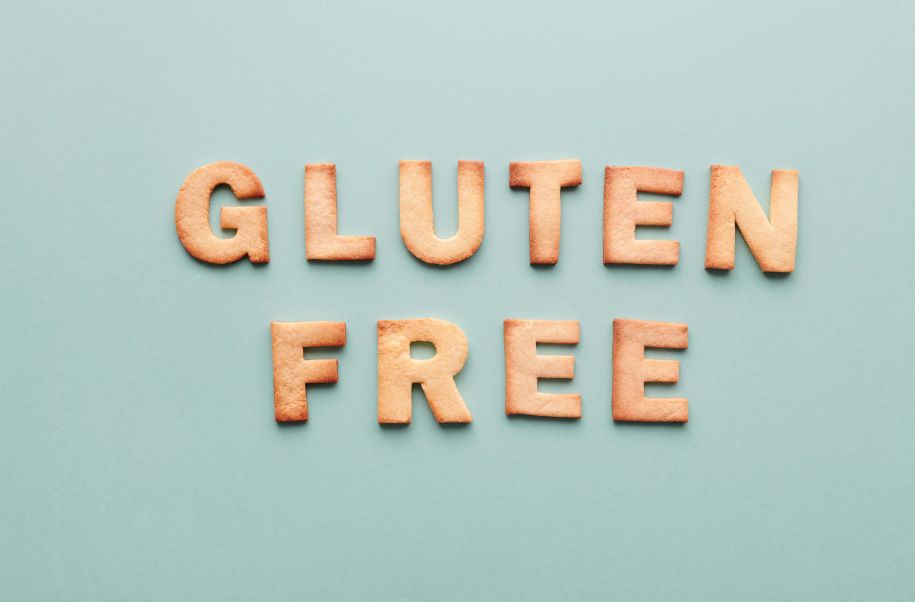
At least three million people in the US have celiac disease. It’s probably higher since many don’t get tested. My two teen boys were diagnosed in late 2023. Our grocery shopping and meal planning changed abruptly. I was always good at prepping meals prior to their diagnosis, but now it is ultra important for us to be organized and always have a well-stocked pantry, freezer, and refrigerator. I can’t get lazy and just order a pizza or sandwiches at the last minute because not every restaurant has gluten-free options. Plus, we live in a smaller town that doesn’t offer very many restaurant options. I do think our overall nutrition plan is much better now than in the pre-celiac days so that’s been a positive factor for all of us.
There are people that have debilitating symptoms if they eat gluten. Luckily, my kids don’t react that drastically. Some of the symptoms of being “glutened” included vomiting, diarrhea, headache, bloating, and abdominal pain. It’s best to drink plenty of water if you accidentally ingest gluten. This is due to dehydration from these symptoms.
I’m on a few social media message boards and there is a lot of concern with food labels, ingredients, and cross contamination. Some have anxiety over the food they’re eating during family celebrations. Even though celiac runs in families, not everyone is on board with the diet or understands the challenges it causes. Sometimes even our family members aren’t supportive, and it may cause strained relationships.
Limit your meals to eating at home, dedicated gluten-free restaurants, health food stores, or farmers markets. While these places can offer celiac-safe options, it’s still essential for individuals to communicate their dietary needs clearly to restaurant staff and ask questions about food preparation methods to ensure a safe dining experience.
These challenges are more than enough reason to adopt a whole foods nutrition plan. Whole foods are naturally gluten-free. You won’t have to rely on food manufacturing companies and their employees always doing the right thing. Instead, you’ll be in charge of exactly what you’re consuming and there won’t be any question about cross-contamination. Here are some strategies to help you eat less processed food while adhering to a gluten-free diet:
Focus on Whole Foods – fish, fruit, vegetables, nuts, seeds, beans, dairy, eggs, meat, poultry
Shop the Perimeter – stick to the perimeter of the grocery store where most whole foods are usually found
Cook at Home – cook from scratch and know exactly what ingredients are being used
Meal Prep – plan your meals ahead of time and make large batches to avoid relying on last-minute processed foods
Read Labels Carefully – look for certified gluten-free on labels and avoid additives that you’re unsure of
Stock Up on Staples – stock the pantry with gluten-free flours, pasta, bread, and baking ingredients
Choose Naturally Gluten-Free Snacks – fruit, vegetables, hummus, yogurt, nuts, seeds
Be Mindful of Cross-Contamination – use separate utensils, cookware, and food prep areas
Make your nutrition plan a priority. By focusing on whole, minimally processed foods, you can successfully manage celiac disease while reducing your intake of ultra processed foods. Additionally, consulting with a registered dietitian who specializes in celiac disease can provide personalized guidance and support in transitioning to a healthier, less processed meal plan.
If you’re traveling, then you’ll want to research nearby restaurants or reserve a hotel with a kitchenette and buy your own groceries. Proactively planning your vacation meals will remove most of the stress and the apprehension of what you’re going to eat all week. When we traveled to Clearwater Beach, Florida recently, the restaurants had enough gluten-free options to appease my boys. Mexican food at “Taco Bus” and “Gondolier Pizza” were big hits for lunch. The Asian fusion restaurant called “Ocean Hai” offered several gluten-free options, including calamari, grouper, and a New York strip steak. Our favorite experience was at “E&E Stakeout” in Belleaire Bluffs where we had an amazing filet. The servers at these restaurants were more than helpful and they really made things easy for us. I had done a little research prior to our trip and made notes in my journal. I found these restaurants, so I made reservations a few weeks ahead of time. There were a few small markets that offered enough options for snacking in between meals.
The real key to solving your anxiety with eating gluten-free is taking the time to prepare in advance. Whether it’s cooking at home, eating out, or traveling, be mindful of your daily meal intake and how you’re going to manage it. You should always feel like you’re in complete control of your dietary needs. Here is a list of every day coping strategies that you can implement:
*Practice self-care and stress management techniques
*Build a strong support network of friends, family, and healthcare professionals
*Seek therapy or counseling for mental health support
*Engaging in activities and hobbies that are fulfilling
There’s definitely a stigma around eating gluten-free. Many who are uneducated on the topic tend to make negative remarks. Emotional strain for individuals with celiac disease can stem from various factors such as navigating social situations, managing dietary restrictions, and copy with potential health complications.
Support for those with celiac often involves education about the condition, access to gluten-free resources, emotional support networks, and understanding from friends, family and healthcare professionals. Additionally, joining support groups or online communities can offer valuable guidance for people living with the disease. I would encourage people living with the disease to research and learn as much as possible so they can make informed decisions.
It’s a good idea to gradually change your way of thinking and focus on having a positive outlook. This can significantly help individuals living with celiac. You will feel empowered and make proactive choices instead of dwelling on limitations. Having a positive attitude fosters resilience in the face of challenges. You can learn to become more flexible when navigating restrictions and social settings. Being optimistic about the future will inspire individuals to remain hopeful about advancements, research, and product availability. These factors will enhance your overall well-being and improve your quality of life. Drop a helpful comment below as to how you navigate your gluten-free diet. Reach out anytime to Kim at nourishandflex@gmail.com

